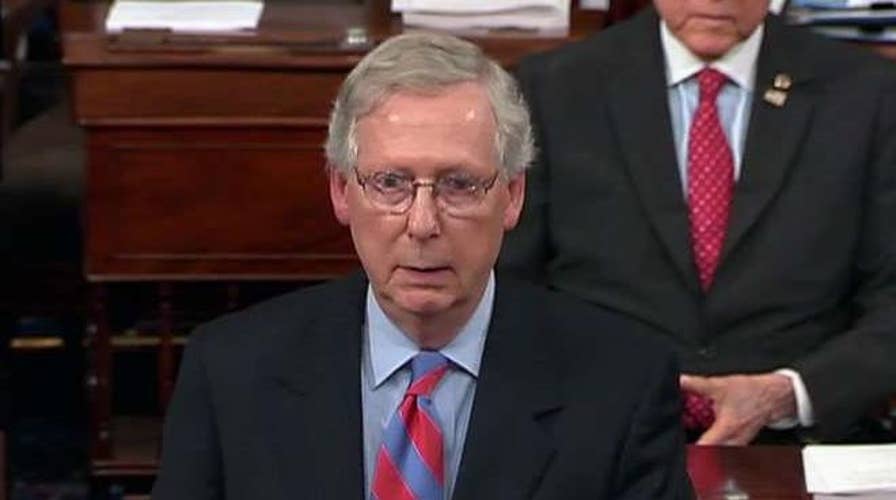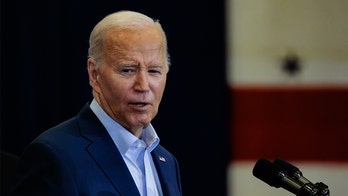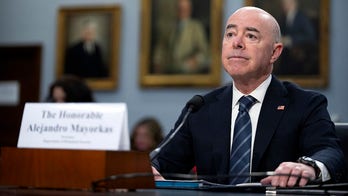Sen. McConnell: Clearly a disappointing moment
Senate majority leader addresses Senate as 'skinny repeal' of ObamaCare fails after Republican Sens. McCain, Murkowski and Collins vote no
Congress has left Washington for the summer with a trail of unfinished business and several immediate concerns when they return in September -- increasing the federal debt limit and passing a temporary spending bill to avert a government shutdown.
The effort by the Republican-led Congress to repeal and replace ObamaCare appears dead for now, despite President Trump goading leaders to try again to give him a major legislative victory.
"We've pivoted to tax reform and I think we've got to stay on that," Utah Republican Sen. Orrin Hatch, chairman of the Senate Finance Committee, said Friday.
GOP House leaders passed their ObamaCare overhaul bill in May. But Senate Majority Leader Mitch McConnell tried and failed several times since early July to present a bill that at least 50 of his 52 GOP senators could support and pass.
With passage appearing at least possible last month, the Kentucky Republican boldly required senators to stay on Capitol Hill for the first two weeks of their August recess.
But after a series of repeal and-or replace measures failed in recent weeks, lawmakers returned to their home states, with some taking overseas trips as part of congressional delegations.
Congress must increase the debt limit to prevent a jarring federal default.
Though many Republicans cannot bring themselves to back a debt increase, since they run the government it's their responsibility to deliver those votes. Democratic support also will be required, and some hope they'll win concessions in exchange.
A stopgap measure will be needed because the 12 annual spending bills are behind schedule. There's no agreement on their overall price tag, which will be in the $1 trillion-plus range.
One wild card is whether Trump will press to fund the U.S.-Mexico border wall he has pledged. That could spark a nasty confrontation with Democrats.
Republicans have had few major successes in their first seven months of controlling the White House and Capitol Hill.
Among their victories, the Senate sent Justice Neil Gorsuch to the Supreme Court, and Congress passed bills bolstering veterans' health programs and financing the Food and Drug Administration.
Members also approved another sanctioning Russia for its 2016 election meddling, which Trump resentfully signed knowing Congress would lopsidedly override a veto.
Passing tax reform upon returning to Capitol Hill after Labor Day would give congressional Republicans a big win -- as next year’s midterm elections, with all 435 House seats on the line, fast approach.
The White House and Republicans promise to revamp the loophole-choked tax code and lower rates for corporations and individuals. Along with repealing and replacing former President Barack Obama's signature health care law, this is the Holy Grail for the GOP.
But core principles remain unresolved, including whether the effort would further bloat the budget deficit. Crucial details must be settled, among them how far to lower rates and which tax credits and deductions would be erased. The last time those problems were reconciled and the tax code broadly reshaped was 1986.
The Senate aims to approve the annual defense policy bill in September. That's when Senate Armed Services Committee Chairman John McCain, R-Ariz., expects to return to Washington after starting brain cancer treatment. He and McConnell wanted to pass the bill last month. But Sen. Rand Paul, R-Ky., thwarted that plan. Paul wants votes on amendments on indefinite detention and war authorization.
McCain has warned he'll use the bill to map a strategy for Afghanistan if Trump fails to develop a plan.
The House and Senate intelligence committees are investigating whether Russia worked with Trump's presidential campaign to try to help him win the election. The FBI and Justice Department special counsel Robert Mueller are also investigating.
Trump has repeatedly denigrated the issue as "fake news" and a "witch hunt."
Lawmakers from both parties seem determined to press on. Senators introduced bipartisan bills last week creating judicial review procedures that could shield Mueller from firing by Trump.
They hope to approve a bipartisan bill speeding federal approval of projects to export liquified natural gas and boosting energy sources and efficiency.
Republicans also want to roll back the Endangered Species Act, saying it hinders drilling and logging.
In addition, several programs expire Sept. 30, including the Children's Health Insurance Program, a Democratic favorite.
Also facing expiration are federal flood insurance and programs run by the Federal Aviation Administration.
Conservatives chafe at renewing flood insurance, which is $25 billion in debt. FAA renewal is stuck over a plan to transfer the agency's air traffic control system to a private non-profit organization.
The Associated Press contributed to this report.





